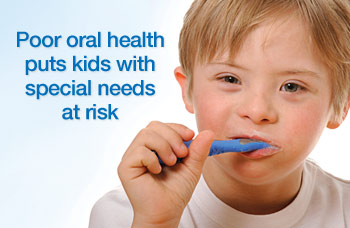Managing Tooth Decay In Children With Chronic Diseases
Poor oral health puts kids with special needs at risk

If we're lucky, life is a chronic condition! Chronic is derived from the ancient Greek word “chronos” meaning time, but in the medical sense the word has come to be associated with a variety of long-standing diseases and disorders. Almost all children endure a variety of different health problems during infancy and childhood, but for most the problems are mild, they come and go, and they do not interfere with daily life and development. In fact, it can be argued that childhood illnesses play a role in the development of the immune (resistance) system. However, for some children with chronic health conditions (also known as children with special healthcare needs), everyday life is affected throughout childhood and beyond.
Dental care is the most neglected healthcare need of children and adolescents who have chronic conditions and diseases.
Dental care is the most neglected healthcare need of children and adolescents who have chronic conditions and diseases. Understanding children's medical conditions is crucial to pediatric dentistry, particularly when advances in therapy and technology have extended the lives of more children and adolescents with chronic diseases. Primary (baby) teeth are important to all children for normal growth and development, for eating, speech, and normal social development. In addition, they act as space-holders for permanent adult teeth. This is especially important for children with special healthcare needs, many of whom are at risk for failure to thrive and nutritional deficiencies, and are more susceptible to dental decay.
Special dental considerations and care are required for children with chronic diseases and disorders. A wide spectrum of chronic conditions afflicts children, which can affect their intellectual capacity, behavior and physical abilities, and may compromise their ability to seek dental care. There are many common issues and helpful strategies that ensure the potential for normal oral growth and development, to prevent dental disease and maintain health. When implemented they can facilitate and complement their overall social and emotional health — and well-being.
Behavioral ConditionsBehavioral conditions such as autism, intellectual and developmental disabilities, and attention deficit and hyperactivity disorder (ADHD), lead to decreased willingness or ability to cooperate with activities of daily living. Many children with special needs (and their parents or caregivers), may not understand the need for prevention, or how to perform effective oral hygiene. Indeed children with physical disabilities may not even be capable of performing effective oral hygiene without help. It is imperative that parents and caregivers search out instruction and training from dental professionals to learn how to physically optimize the oral hygiene of the child with special needs.
In addition some children with special needs may have severe gag reflexes including the inability to tolerate toothpaste, trouble expectorating (coughing or spitting out), or keeping their mouths open. These factors make it difficult for caregivers to brush their child's teeth.
Developmental Tooth DefectsChildren with chronic health conditions are more likely to be born with developmental tooth defects. One example is enamel hypoplasia (“hypo” – under; “plasia” – growth), a condition in which there is an insufficient amount of enamel on the teeth. Enamel is one of the hardest substances produced in the animal world, and forms the outermost layer of the crowns of teeth. Children diagnosed with conditions such as Down, Treacher-Collins, or Turner syndromes (genetic birth defects), are at risk for developmental tooth defects, as are very low birth weight infants.
Some of these children, including those with swallowing difficulties or intellectual and developmental disabilities, may have feeding problems involving prolonged meals and food pouching (hoarding food in their cheeks).




